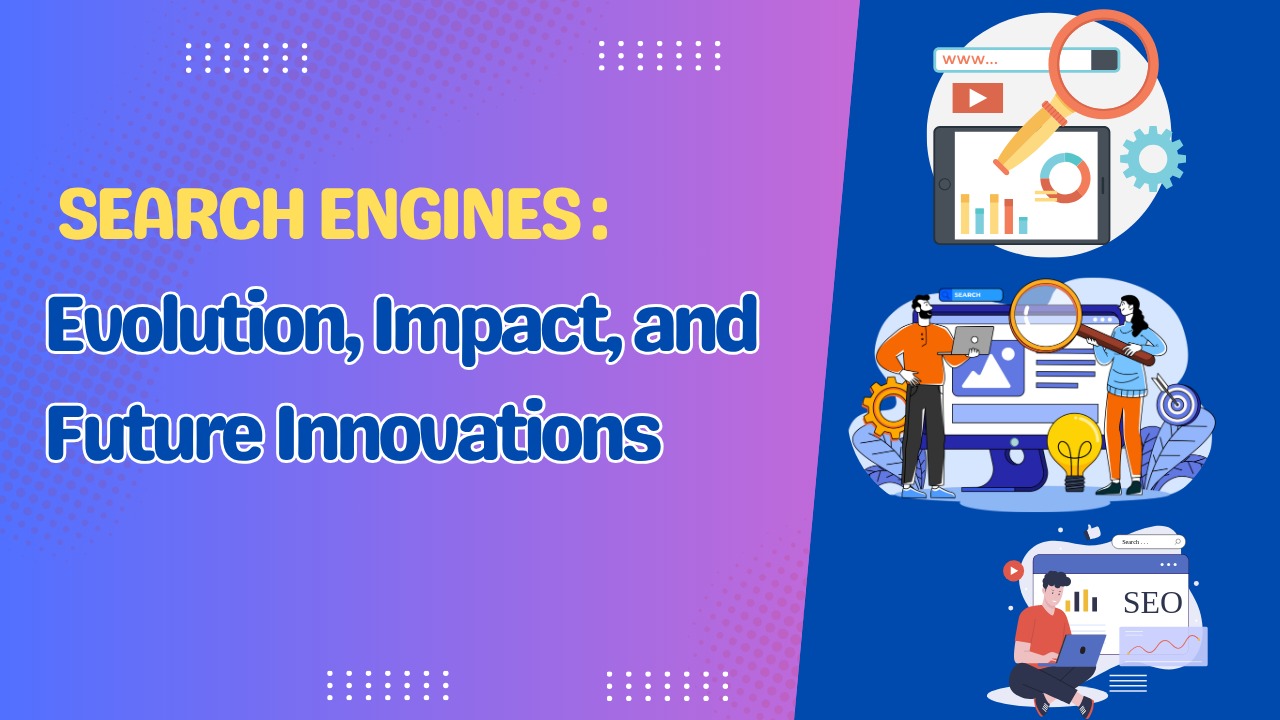Search engines have become essential tools in our daily lives. They help us find information, products, and services quickly and easily, making it easier to navigate the vast amount of data on the internet. What began as a simple tool to locate websites has grown into a powerful system used by millions of people around the world.
These advanced systems process billions of queries daily, using complex algorithms to deliver the most relevant results. Over time, search engines have significantly impacted how we access and use information, influencing everything from personal research to global business operations. They have become crucial in marketing, advertising, and content creation.
Looking ahead, search engines will continue to evolve, incorporating artificial intelligence and other advanced technologies to further enhance user experience. As they become more sophisticated, they will shape the future of online interaction, offering even more personalized and efficient results. The future promises exciting developments for these technological giants.
The Birth of Search Engines

Early History
The history of search engines dates back to the early days of the internet. In the late 1980s and early 1990s, the web was in its infancy, and it was becoming increasingly difficult to find relevant information. Early versions of search engines were not as advanced as the tools we use today, but they laid the foundation for what was to come.
One of the first attempts to create a search engine was JumpStation (1993), created by Jonathon Fletcher. JumpStation allowed users to search the titles and headings of web pages. However, its capabilities were limited, and it wasn’t a widely used tool.
In 1994, WebCrawler made a significant breakthrough by becoming the first search engine to index the entire text of a webpage. This made it possible to search for specific words or phrases on a webpage, making the search process more effective and accurate. While it was revolutionary for its time, it wasn’t the only player in the field.
The Rise of Altavista and Yahoo
In 1995, AltaVista entered the search engine race and became one of the first search engines to offer a fast, multi-threaded crawler and an efficient indexing system. AltaVista was among the first to provide users with complex search results, including support for Boolean operators, phrase searching, and even multimedia content like images and videos.
At the same time, Yahoo! emerged as one of the most popular internet directories. While Yahoo! started as a human-curated directory, it eventually evolved into a search engine by incorporating crawling and indexing technology. Yahoo!’s search engine became a staple of the early web era and remained highly influential until the turn of the millennium.
The Google Revolution
In 1998, Google was founded by Larry Page and Sergey Brin while they were graduate students at Stanford University. Google introduced the world to the PageRank algorithm, a unique system for ranking webpages based on their inbound links. The algorithm essentially argued that the more authoritative a page was (as determined by the quality and quantity of links pointing to it), the more relevant it should be in search results.
Google’s clean, minimalist interface set it apart from its competitors, and its speed and accuracy in delivering relevant search results helped it gain traction quickly. Google’s rise signaled the beginning of a new era in search engine technology.
How Search Engines Work
Search engines have become increasingly sophisticated over time. They use a complex series of algorithms, crawlers, and indexing systems to deliver relevant results in response to user queries. Understanding the underlying mechanisms of search engines can help us appreciate the technological advancements behind these tools.
Crawling
Crawling is the first step in the search process. Search engines use automated bots, also known as spiders or crawlers, to systematically browse the web and gather information about the content of websites. These bots follow links from one page to another, continuously gathering and storing data. The crawling process allows search engines to discover new pages, update their indexes, and assess the relevance of existing content.
The crawlers visit websites and analyze key elements such as text, images, and metadata to assess the quality and relevance of the content. Pages are ranked based on a variety of factors, including keyword usage, content relevance, and user experience.
Indexing
Once a page is crawled, the search engine needs to organize the collected data. This is where indexing comes into play. During the indexing process, the search engine analyzes the content of the page and stores important data such as keywords, metadata, and content structure.
The search engine’s index is essentially a massive database that stores information about web pages in a way that allows it to be retrieved quickly. When a user submits a query, the search engine searches its index to find the most relevant results.
Ranking
The ranking process is the most crucial step in delivering search results. When a user submits a query, the search engine’s algorithms analyze millions of indexed pages to determine which ones are the most relevant to the query. Factors such as keyword relevance, content quality, backlinks, and user experience all play a role in determining rankings.
Search engines use algorithms to rank pages. Google’s algorithm, for instance, has evolved over the years to incorporate hundreds of different ranking signals. Early algorithms like PageRank focused heavily on link quality, while more recent updates like RankBrain and BERT emphasize user intent and content relevance.
The Role of Search Engines in Modern Society
Search Engines as Gateways to Information
Search engines have transformed how we access information. In the past, finding specific data could take hours, if not days, of research. Now, with just a few clicks, we can find virtually anything we need, whether it’s academic research, recipes, news, or entertainment.
Search engines have democratized access to knowledge. They have leveled the playing field, allowing anyone with an internet connection to find reliable sources of information. In many ways, they have reshaped the way we interact with the internet, shifting the focus from individual websites to highly specialized search engines that aggregate information from across the web.
Impact on Business and Marketing
For businesses, search engines are critical to success. Search Engine Optimization (SEO) has become a cornerstone of digital marketing, as companies strive to improve their visibility on search engine results pages (SERPs). SEO encompasses a wide range of strategies aimed at improving a website’s ranking, such as optimizing content, improving user experience, and earning high-quality backlinks.
Search engines are also a major source of revenue for businesses, especially those relying on paid search advertising. Google AdWords, for example, allows businesses to display ads on Google’s search results pages. These ads are displayed based on keyword relevance, and businesses only pay when users click on their ads (pay-per-click, or PPC). This advertising model has generated billions in revenue for Google and other search engine companies.
Influence on Content Creation
For content creators, search engines are both a boon and a challenge. On one hand, search engines enable creators to reach a broad audience and drive traffic to their websites. On the other hand, search engines have become increasingly complex, and ranking well on SERPs requires more than just creating great content. Content creators must also stay up to date with algorithm changes and optimize their content to meet the ever-evolving demands of search engines.
The Impact of Artificial Intelligence and Conversational Search
The Role of AI in Search
Artificial Intelligence (AI) is playing an increasingly important role in the development of search engines. For instance, Google’s RankBrain uses machine learning to better understand the meaning behind user queries, especially ambiguous or long-tail queries. This means that search engines are becoming better at interpreting context, user intent, and delivering more accurate results.
Google’s BERT (Bidirectional Encoder Representations from Transformers) is another AI-driven update that focuses on understanding the context of words in search queries. BERT enables search engines to interpret natural language more effectively and provide more relevant results.
AI is also enhancing other aspects of search engines, such as voice search and chatbots. Users can now speak to their devices, and AI-powered systems interpret the voice commands and provide relevant responses.
The Emergence of Conversational Search
Conversational search is a new paradigm in which users can engage in two-way dialogues with search engines. Unlike traditional search, where users enter keywords and receive a list of links, conversational search allows users to ask questions, refine their queries, and receive personalized answers.
Google’s AI Mode, for example, is designed to offer conversational answers rather than just a list of links. This is part of the broader trend of making search engines more interactive and capable of handling complex, nuanced queries.
Privacy and Ethical Concerns
As search engines become more powerful, privacy concerns have grown. Users are increasingly worried about how their data is being collected and used. Major search engines like Google collect vast amounts of personal data to refine their algorithms and target ads. This has led to calls for greater transparency and privacy protections.
Some search engines, like DuckDuckGo and Brave, have emerged as privacy-conscious alternatives. These search engines promise not to track users’ data, offering a more secure and anonymous search experience.
The Future of Search Engines
The Rise of Voice Search and Smart Devices
The future of search is increasingly mobile and voice-driven. With the rise of smart speakers like Amazon’s Alexa, Google Home, and Apple’s Siri, users are relying more on voice search to interact with the web. Voice search presents new challenges for search engines, as queries are often more conversational and context-dependent.
Search engines will need to adapt to these new modes of interaction by developing more sophisticated AI systems that can understand and respond to natural language commands. Voice search is expected to continue growing in importance, especially as smart devices become more integrated into our daily lives.
Augmented Reality (AR) and Search
Another exciting development is the integration of augmented reality (AR) with search engines. Google’s recent push into AR search technologies allows users to search for 3D objects and visualize them in their real-world environment. For example, a user can search for a product and see how it looks in their home using AR.
As AR technologies mature, search engines will likely become more immersive, allowing users to interact with information in new and innovative ways. This could radically change how we search for information, blurring the lines between the digital and physical worlds.
Ethical and Social Implications
As search engines continue to evolve, the ethical and social implications will become increasingly important. Issues related to algorithmic bias, monopoly power, and data privacy will need to be addressed. The role of search engines in shaping public discourse is another area of concern, as they have the power to influence how people perceive news, events, and even political candidates.
Search engines will need to balance innovation with responsibility, ensuring that their algorithms remain fair and transparent. Governments and regulators may play a larger role in overseeing the operations of search engines, particularly as they continue to expand their influence.
Here is the Top: Search Engine Submission Sites List
| S. No. | Search Engine Submission Sites List | Status |
|---|---|---|
| 1 | https://ziyuan.baidu.com/linksubmit/url | Active |
| 2 | https://anaximanderdirectory.com/submit/ | Active |
| 3 | https://thalesdirectory.com/submit/ | Active |
| 4 | https://smallseotools.com/ | Active |
| 5 | https://gigablast.com/addurl | Active |
| 6 | https://millionshort.com/submit | Active |
| 7 | https://www.freewebsubmission.com/ | Active |
| 8 | https://www.whatuseek.com/addurl.shtml | Active |
| 9 | https://www.exactseek.com/add.html | Active |
| 10 | https://viesearch.com/submit | Active |
| 11 | https://www.activesearchresults.com/ | Active |
| 12 | https://www.activesearchresults.com/addwebsite.php | Active |
| 13 | https://jayde.com/submit.html | Active |
| 14 | https://anoox.com/ | Active |
| 15 | https://anoox.com/add_for_indexing_free.php | Active |
| 16 | https://websquash.com/ | Active |
| 17 | https://www.submitstart.com/#google_vignette | Active |
| 18 | https://lookseek.com/ | Active |
| 19 | https://www.cipinet.com/suggest.php?action=addlink | Active |
| 20 | https://www.247webdirectory.com/submit.aspx | Active |
| 41 | https://submitshop.com/free-submit/ | Active |
| 42 | https://addurlfree.com/ | Active |
| 43 | search.yahoo.com/info/submit.html | Active |
| 44 | https://www.similarsites.com/ | Active |
| 45 | https://www.dxpnet.com/ads/ | Active |
| 46 | https://www.ezistreet.com/submit | Active |
Conclusion
In conclusion, search engines have revolutionized the way we access and interact with information, evolving from basic text-based directories into advanced AI-powered platforms. They play a central role in education, business, communication, and daily decision-making, offering instant access to vast digital knowledge. As technology advances, search engines continue to become more intuitive, personalized, and integrated with voice, augmented reality, and conversational AI.
However, their increasing influence also raises important ethical concerns, including data privacy, algorithmic transparency, and monopolistic control. To ensure a fair and equitable digital future, developers, users, and regulators must work together to address these challenges.
The future of search engines lies in balancing innovation with responsibility, enhancing user experience while safeguarding individual rights. As we move forward, search engines will remain vital tools, continually reshaping our digital experiences and pushing the boundaries of how we search, learn, and connect in an increasingly interconnected world.

